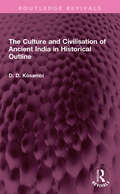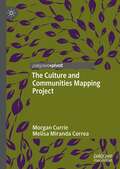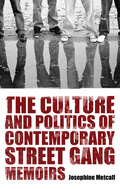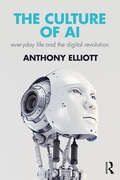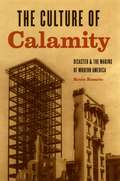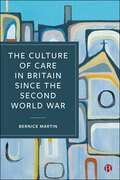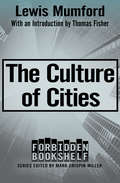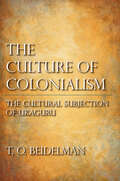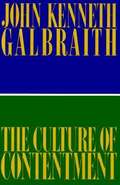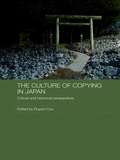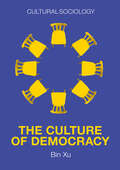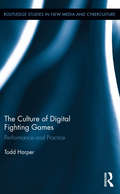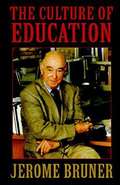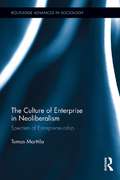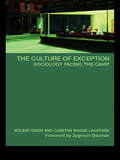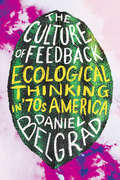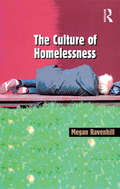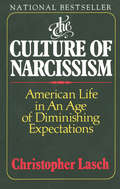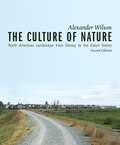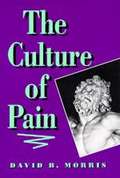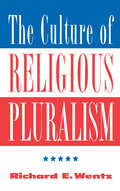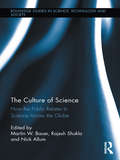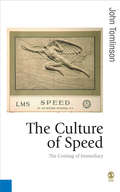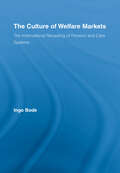- Table View
- List View
The Culture and Civilisation of Ancient India in HIstorical Outline (Routledge Revivals)
by D D KosambiFirst published in 1965, The Culture and Civilisation of Ancient India in Historical Outline is a strikingly original work, the first real cultural history of India. The main features of the Indian character are traced back into remote antiquity as the natural outgrowth of historical process. Did the change from food gathering and the pastoral life to agriculture make new religions necessary? Why did the Indian cities vanish with hardly a trace and leave no memory? Who were the Aryans – if any? Why should Buddhism, Jainism, and so many other sects of the same type come into being at one time and in the same region? How could Buddhism spread over so large a part of Asia while dying out completely in the land of its origin? What caused the rise and collapse of the Magadhan empire; was the Gupta empire fundamentally different from its great predecessor, or just one more ‘oriental despotism’? These are some of the many questions handled with great insight, yet in the simplest terms, in this stimulating work. This book will be of interest to students of history, sociology, archaeology, anthropology, cultural studies, South Asian studies and ethnic studies.
The Culture and Communities Mapping Project
by Morgan Currie Melisa Miranda CorreaThis book describes three years of work by the Culture and Communities Mapping Project, a research project based in Edinburgh that uses maps as an object of study and also a means to facilitate research. Taking a self-reflexive approach, the book draws on a variety of iterative mapping procedures and visual methodologies, from online virtual tours to photo elicitation, to capture the voices of inhabitants and their distinctive perspectives on the city. The book argues that practices of cultural mapping consist of a research field in and of itself, and it situates this work in relation to other areas of research and practice, including critical cartography, cultural geography, critical GIS, activist mapping and artist maps. The book also offers a range of practical approaches towards using print and web-based maps to give visibility to spaces traditionally left out of city representations but that are important to the local communities that use them. Throughout, the authors reflect critically on how, through the processes of mapping, we create knowledge about space, place, community and culture.
The Culture and Politics of Contemporary Street Gang Memoirs
by Josephine MetcalfThe publication of Sanyika Shakur's Monster: The Autobiography of an L.A. Gang Member in 1993 generated a huge amount of excitement in literary circles—New York Times book critic Michiko Kakutani deemed it a “shocking and galvanic book”—and set off a new publishing trend of gang memoirs in the 1990s. The memoirs showcased tales of violent confrontation and territorial belonging but also offered many of the first journalistic and autobiographical accounts of the much-mythologized gang subculture. In The Culture and Politics of Contemporary Street Gang Memoirs, Josephine Metcalf focuses on three of these memoirs—Shakur’s Monster; Luis J. Rodriguez’s Always Running: La Vida Loca: Gang Days in L.A.; and Stanley “Tookie” Williams’s Blue Rage, Black Redemption—as key representatives of the gang autobiography. Metcalf examines the conflict among violence, thrilling sensationalism, and the authorial desire to instruct and warn competing within these works. The narrative arcs of the memoirs themselves rest on the process of conversion from brutal, young gang bangers to nonviolent, enlightened citizens. Metcalf analyzes the emergence, production, marketing, and reception of gang memoirs. Through interviews with Rodriguez, Shakur, and Barbara Cottman Becnel (Williams’s editor), Metcalf reveals both the writing and publishing processes. This book analyzes key narrative conventions, specifically how diction, dialogue, and narrative arcs shape the works. The book also explores how these memoirs are consumed. This interdisciplinary study—fusing literary criticism, sociology, ethnography, reader-response study, and editorial theory—brings scholarly attention to a popular, much-discussed, but understudied modern expression.
The Culture of AI: Everyday Life and the Digital Revolution
by Anthony ElliottIn this ground-breaking book, Cambridge-trained sociologist Anthony Elliott argues that much of what passes for conventional wisdom about artificial intelligence is either ill-considered or plain wrong. The reason? The AI revolution is not so much about cyborgs and super-robots in the future, but rather massive changes in the here-and-now of everyday life. In The Culture of AI, Elliott explores how intelligent machines, advanced robotics, accelerating automation, big data and the Internet of Everything impact upon day-to-day life and contemporary societies. With remarkable clarity and insight, Elliott’s examination of the reordering of everyday life highlights the centrality of AI to everything we do – from receiving Amazon recommendations to requesting Uber, and from getting information from virtual personal assistants to talking with chatbots. The rise of intelligent machines transforms the global economy and threatens jobs, but equally there are other major challenges to contemporary societies – although these challenges are unfolding in complex and uneven ways across the globe. The Culture of AI explores technological innovations from industrial robots to softbots, and from self-driving cars to military drones – and along the way provides detailed treatments of: The history of AI and the advent of the digital universe; automated technology, jobs and employment; the self and private life in times of accelerating machine intelligence; AI and new forms of social interaction; automated vehicles and new warfare; and, the future of AI. Written by one of the world’s foremost social theorists, The Culture of AI is a major contribution to the field and a provocative reflection on one of the most urgent issues of our time. It will be essential reading to those working in a wide variety of disciplines including sociology, science and technology studies, politics, and cultural studies.
The Culture of Calamity
by Kevin RozarioTurn on the news and it looks as if we live in a time and place unusually consumed by the specter of disaster. The events of 9/11 and the promise of future attacks, Hurricane Katrina and the destruction of New Orleans, and the inevitable consequences of environmental devastation all contribute to an atmosphere of imminent doom. But reading an account of the San Francisco earthquake of 1906, with its vivid evocation of buildings "crumbling as one might crush a biscuit," we see that calamities--whether natural or man-made--have long had an impact on the American consciousness. Uncovering the history of Americans' responses to disaster from their colonial past up to the present, Kevin Rozario reveals the vital role that calamity--and our abiding fascination with it--has played in the development of this nation. Beginning with the Puritan view of disaster as God's instrument of correction, Rozario explores how catastrophic events frequently inspired positive reactions. He argues that they have shaped American life by providing an opportunity to take stock of our values and social institutions. Destruction leads naturally to rebuilding, and here we learn that disasters have been a boon to capitalism, and, paradoxically, indispensable to the construction of dominant American ideas of progress. As Rozario turns to the present, he finds that the impulse to respond creatively to disasters is mitigated by a mania for security. Terror alerts and duct tape represent the cynical politician's attitude about 9/11, but Rozario focuses on how the attacks registered in the popular imagination--how responses to genuine calamity were mediated by the hyperreal thrills of movies; how apocalyptic literature, like the best-selling Left Behind series, recycles Puritan religious outlooks while adopting Hollywood's style; and how the convergence of these two ways of imagining disaster points to a new postmodern culture of calamity.The Culture of Calamitywill stand as the definitive diagnosis of the peculiarly American addiction to the spectacle of destruction.
The Culture of Care in Britain since the Second World War
by Bernice MartinThis book examines the evolving value of caregiving in Britain, from the welfare state's inception to the present day. It explores the shifts in discourse surrounding care, charting key social, demographic, economic, political and cultural changes which have led to the current 'care crisis'. The author examines five key themes: the tension within institutional Christianity between caring for the marginalized versus maintaining 'respectability'; the secularization of the value of care and its interaction with emerging social divisions; the persistent expectation that women bear the caregiving burden; the economic and social undervaluation of emotional and practical care work; and the challenges facing the care and health sectors. The author suggests that recalibrating the tax system to shift the burden from incomes to profits may be necessary for the survival of welfare systems under these new conditions.
The Culture of Cities (Forbidden Bookshelf #19)
by Mark Crispin Miller Lewis Mumford Thomas FisherA visionary survey of urbanism from the Middle Ages to the late 1930s, with a new introduction by Thomas Fisher Considered among the greatest works of Lewis Mumford--a prolific historian, sociologist, philosopher of technology, and longtime architecture critic for the New Yorker--The Culture of Cities is a call for communal action to "rebuild the urban world on a sounder human foundation." First published in 1938, this radical investigation into the human environment is based on firsthand surveys of North American and European locales, as well as extensive historical and technological research. Mumford takes readers from the compact, worker-friendly streets of medieval hamlets to the symmetrical neoclassical avenues of Renaissance cities. He studies the squalor of nineteenth-century factory towns and speculates on the fate of the booming twentieth-century Megalopolis--whose impossible scale, Mumford believes, can only lead to its collapse into a "Nekropolis," a monstrosity of living death. A civic visionary, Mumford is credited with some of the earliest proposals for ecological urban planning and the appropriate use of technology to create balanced living environments. In the final chapters of The Culture of Cities, he outlines possible paths toward utopian future cities that could be free of the stressors of the Megalopolis, in sync with the rhythms of daily life, powered by clean energy, integrated with agricultural regions, and full of honest and comfortable housing for the working class. The principles set forth by these visions, once applied to Nazi-occupied Europe's razed cities, are still relevant today as technological advances and overpopulation change the nature of urban life.
The Culture of Colonialism: The Cultural Subjection of Ukaguru (African Systems of Thought)
by T. O. BeidelmanWhat did it mean to be an African subject living in remote areas of Tanganyika at the end of the colonial era? For the Kaguru of Tanganyika, it meant daily confrontation with the black and white governmental officials tasked with bringing this rural people into the mainstream of colonial African life. T. O. Beidelman's detailed narrative links this administrative world to the Kaguru's wider social, cultural, and geographical milieu, and to the political history, ideas of indirect rule, and the white institutions that loomed just beyond their world. Beidelman unveils the colonial system's problems as it extended its authority into rural areas and shows how these problems persisted even after African independence.
The Culture of Contentment
by John Kenneth GalbraithA concise, contumacious critique of the complacent class that rules America in the interest of its own comfort, by distinguished economist Galbraith (emeritus, Harvard U.).
The Culture of Copying in Japan: Critical and Historical Perspectives (Japan Anthropology Workshop Series)
by Rupert CoxThis book challenges the perception of Japan as a ‘copying culture’ through a series of detailed ethnographic and historical case studies. It addresses a question about why the West has had such a fascination for the adeptness with which the Japanese apparently assimilate all things foreign and at the same time such a fear of their skill at artificially remaking and automating the world around them. Countering the idea of a Japan that deviously or ingenuously copies others, it elucidates the history of creative exchanges with the outside world and the particular myths, philosophies and concepts which are emblematic of the origins and originality of copying in Japan. The volume demonstrates the diversity and creativity of copying in the Japanese context through the translation of a series of otherwise loosely related ideas and concepts into objects, images, texts and practices of reproduction, which include: shamanic theatre, puppetry, tea utensils, Kyoto town houses, architectural models, genres of painting, calligraphy, and poetry, ‘sample’ food displays, and the fashion and car industries.
The Culture of Defeat: On National Trauma, Mourning, and Recovery
by Wolfgang Schivelbusch Jefferson ChaseHow defeated nations have handled it.
The Culture of Democracy: A Sociological Approach to Civil Society (Cultural Sociology)
by Bin XuAgainst the bleak backdrop of pressing issues in today&’s world, civil societies remain vibrant, animated by people&’s belief that they should and can solve such issues and build a better society. Their imagination of a good society, their understanding of their engagement, and the ways they choose to act constitute the cultural aspect of civil society. Central to this cultural aspect of civil society is the &“culture of democracy,&” including normative values, individual interpretations, and interaction norms pertaining to features of a democratic society, such as civility, independence, and solidarity. The culture of democracy varies in different contexts and faces challenges, but it shapes civic actions, alters political and social processes, and thus is the soul of modern civil societies. The Culture of Democracy provides the first systematic survey of the cultural sociology of civil society and offers a committed global perspective. It shows that, as everyone is eager to have their voice heard, cultural sociology can serve as an &“art of listening,&” a thoroughly empirical approach that takes ideas, meanings, and opinions seriously, for people to contemplate significant theoretical and public issues.
The Culture of Digital Fighting Games: Performance and Practice (Routledge Studies in New Media and Cyberculture)
by Todd HarperThis book examines the complex network of influences that collide in the culture of digital fighting games. Players from all over the world engage in competitive combat with one another, forming communities in both real and virtual spaces, attending tournaments and battling online via internet-connected home game consoles. But what is the logic behind their shared playstyle and culture? What are the threads that tie them together, and how does this inform our understanding of competitive gaming, community, and identity? Informed by observations made at one of the biggest fighting game events in the world – the Evolution Series tournament, or "EVO" – and interviews with fighting game players themselves, this book covers everything from the influence of arcade spaces, to the place of gender and ethnicity in the community, to the clash of philosophies over how these games should be played in the first place. In the process, it establishes the role of technology, gameplay, and community in how these players define both themselves and the games that they play.
The Culture of Education
by Jerome BrunerThis is a book of essays about education. In this commentary on the possibilities of education, eminent psychologist Jerome Bruner explains how education can usher children into their culture, though it often fails to do so. Bruner explores new and rich ways of approaching many of the classical problems that perplex educators.
The Culture of Enterprise in Neoliberalism: Specters of Entrepreneurship (Routledge Advances in Sociology #87)
by Tomas MarttilaThis book provides an empirical study of the increasing importance of the concept of the entrepreneur in the context of the neoliberal cultural paradigm. Using the theoretical framework of the post-structural discourse theory and methods of qualitative discourse analysis, the book describes the changes in political discourse that resulted in the increasing dominance of the figure of the entrepreneur after the late 1980s.
The Culture of Exception: Sociology Facing the Camp (International Library of Sociology)
by Bulent Diken Carsten B. LaustsenWe live in an ever-fragmenting society, in which distinctions between culture and nature, biology and politics, law and transgression, mobility and immobility, reality and representation, seem to be disappearing. This book demonstrates the hidden logic beneath this process, which is also the logic of 'the camp'. Social theory has traditionally interpreted the camp as an anomaly, as an exceptional site situated on the margins of society, aiming to neutralize its 'failed citizens' and 'enemies'. However, in contemporary society, 'the camp' has now become the rule and consequently a new interrogation of its logic is necessary.In this exceptional volume, the authors explore the paradox of the camp, as representing both an old fear of enclosure and a new dream of belonging. They illustrate their arguments by drawing on contemporary sites of exemption - such as refugee camps, rape camps and favelas - as well as sites of self-exemption including gated communities, party tourism and celebrity cultures.
The Culture of Feedback: Ecological Thinking in Seventies America
by Daniel BelgradWhen we want advice from others, we often casually speak of “getting some feedback.” But how many of us give a thought to what this phrase means? The idea of feedback actually dates to World War II, when the term was developed to describe the dynamics of self-regulating systems, which correct their actions by feeding their effects back into themselves. By the early 1970s, feedback had become the governing trope for a counterculture that was reoriented and reinvigorated by ecological thinking. The Culture of Feedback digs deep into a dazzling variety of left-of-center experiences and attitudes from this misunderstood period, bringing us a new look at the wild side of the 1970s. Belgrad shows us how ideas from systems theory were taken up by the counterculture and the environmental movement, eventually influencing a wide range of beliefs and behaviors, particularly related to the question of what is and is not intelligence. He tells the story of a generation of Americans who were struck by a newfound interest in—and respect for—plants, animals, indigenous populations, and the very sounds around them, threading his tapestry with cogent insights on environmentalism, feminism, systems theory, and psychedelics. The Culture of Feedback repaints the familiar image of the ’70s as a time of Me Generation malaise to reveal an era of revolutionary and hopeful social currents, driven by desires to radically improve—and feed back into—the systems that had come before.
The Culture of Homelessness
by Megan RavenhillDespite an extensive literature on homelessness there is surprisingly little work that investigates the roots of homelessness by tracking homeless people over time. In this fascinating and much-needed ethnographic study, Megan Ravenhill presents the results of ten years' research on the streets and in the hostels and day-centres of the UK, incorporating intensive interviews with 150 homeless and formerly homeless people as well as policy makers and professionals working with homeless people. Ravenhill discusses the biographical, structural and behavioural factors that lead to homelessness. Amongst the important and unique features of the study are: the use of life-route maps showing the circumstances and decisions that lead to homelessness, a systematic study of the timescales involved, and a survey of people's exit routes from homelessness. Ravenhill also identifies factors that predict those most vulnerable to homelessness and factors that prevent or considerably delay the onset of homelessness.
The Culture of Narcissism: American Life in an Age of Diminishing Expectations
by Christopher LaschWhen The Culture of Narcissism was first published, it was clear that Christopher Lasch had identified something important: what was happening to American society in the wake of the decline of the family over the last century. The book quickly became a bestseller. This edition includes a new afterword, "The Culture of Narcissism Revisited."
The Culture of Nature: North American Landscape from Disney to Exxon Valdez
by Alexander WilsonSince it was first published in 1991, few books have come close to capturing the depth and breadth of Alexander Wilson’s innovative ecocultural compendium The Culture of Nature. His work was one of the first of its kind to investigate the ideology of the environment, to critique the future according to Disney, and illustrate that the ways we think, teach, talk about, and construct the natural world are as important a terrain as the land itself. Extensively illustrated and meticulously researched, this edition is exquisitely revised and reissued for the Anthropocene.
The Culture of Pain
by David MorrisThis is a book about the meanings we make out of pain. The greatest surprise I encountered in discussing this topic over the past ten years was the consistency with which I was asked a single unvarying question: Are you writing about physical pain or mental pain? The overwhelming consistency of this response convinces me that modern culture rests upon and underlying belief so strong that it grips us with the force of a founding myth. Call it the Myth of Two Pains. We live in an era when many people believe--as a basic, unexamined foundation of thought--that pain comes divided into separate types: physical and mental. These two types of pain, so the myth goes, are as different as land and sea. You feel physical pain if your arm breaks, and you feel mental pain if your heart breaks. Between these two different events we seem to imagine a gulf so wide and deep that it might as well be filled by a sea that is impossible to navigate.
The Culture of Religious Pluralism (Explorations: Contemporary Perspectives on Religion)
by Richard WentzReligious pluralism has been a defining characteristic of the American experience since colonial times. In the twentieth century, as American society has become more radically pluralistic, the issue of religious identity is once again in flux. Providing a historical context, Richard Wentz examines the challenges that pluralism presents to denominationalism and civil religion and considers the contributions secularism and the New Age movement have made to the culture of religious pluralism. Finally, Wentz calls for a new pluralism based on civility and respect, a reimmersion into our religious traditions, and an extension of ourselves into the traditions of others.
The Culture of Science: How the Public Relates to Science Across the Globe (Routledge Studies in Science, Technology and Society)
by Rajesh Shukla Martin W. Bauer Nick AllumThis book offers the first comparative account of the changes and stabilities of public perceptions of science within the US, France, China, Japan, and across Europe over the past few decades. The contributors address the influence of cultural factors; the question of science and religion and its influence on particular developments (e.g. stem cell research); and the demarcation of science from non-science as well as issues including the ‘incommensurability’ versus ‘cognitive polyphasia’ and the cognitive (in)tolerance of different systems of knowledge.
The Culture of Speed: The Coming of Immediacy (Published in association with Theory, Culture & Society)
by John Tomlinson"John Tomlinson's book is an invitation to an adventure. It contains a precious key to unlock the doors into the unmapped and unexplored cultural and ethical condition of 'immediacy'. Without this key concept from now on it will not be possible to make sense of the social existence of our times and its ambivalences." - Ulrich Beck, University of Munich "A most welcome, stimulating and challenging exploration of the cultural impact and significance of speed in advanced modern societies. It successfully interweaves theoretical discourse, historical and contemporary analyses and imaginative use of literary sources, all of which are mobilised in order to provide an original, intellectually rewarding and critical account of the changing significance of speed in our everyday experience." - David Frisby, London School of Economics and Political Science Is the pace of life accelerating? If so, what are the cultural, social, personal and economic consequences? This stimulating and accessible book examines how speed emerged as a cultural issue during industrial modernity. The rise of capitalist society and the shift to urban settings was rapid and tumultuous and was defined by the belief in 'progress'. The first obstacle faced by societies that were starting to 'speed up' was how to regulate and control the process. The attempt to regulate the acceleration of life created a new set of problems, namely the way in which speed escapes regulation and rebels against controls. This pattern of acceleration and control subsequently defined debates about the cultural effects of acceleration. However, in the 21st century 'immediacy', the combination of fast capitalism and the saturation of the everyday by media technologies, has emerged as the core feature of control. This coming of immediacy will inexorably change how we think about and experience media culture, consumption practices, and the core of our cultural and moral values. Incisive and richly illustrated, this eye-opening account of speed and culture provides an original guide to one of the central features of contemporary culture and everyday life.
The Culture of Welfare Markets: The International Recasting of Pension and Care Systems (Routledge Advances in Sociology)
by Ingo BodeThis book examines the rise of welfare markets in Western societies and explores their functioning, regulation and embeddedness by addressing the particular field of old age provision, including both retirement provision and elderly care. It goes beyond a mere social policy analysis by investigating major cultural underpinnings of the new (quasi-)markets, with these underpinnings embracing collective normative representations of how societies (should) institutionally handle old age. The book looks at whether pension and care systems are converging under the influence of globalization – with marketization being a key phenomenon – and to what extent this is creating a transnational culture of welfare markets. This book, the first book to systematically describe and analyse the phenomenon of welfare markets, elucidates the complex cultural underpinnings of care and pensions systems in an era of marketization, arguing that we are facing a cultural struggle over the way late modern societies conceptualize institutional old-age provision.
